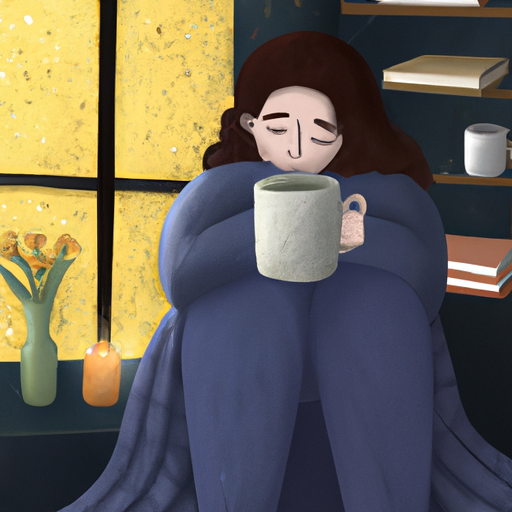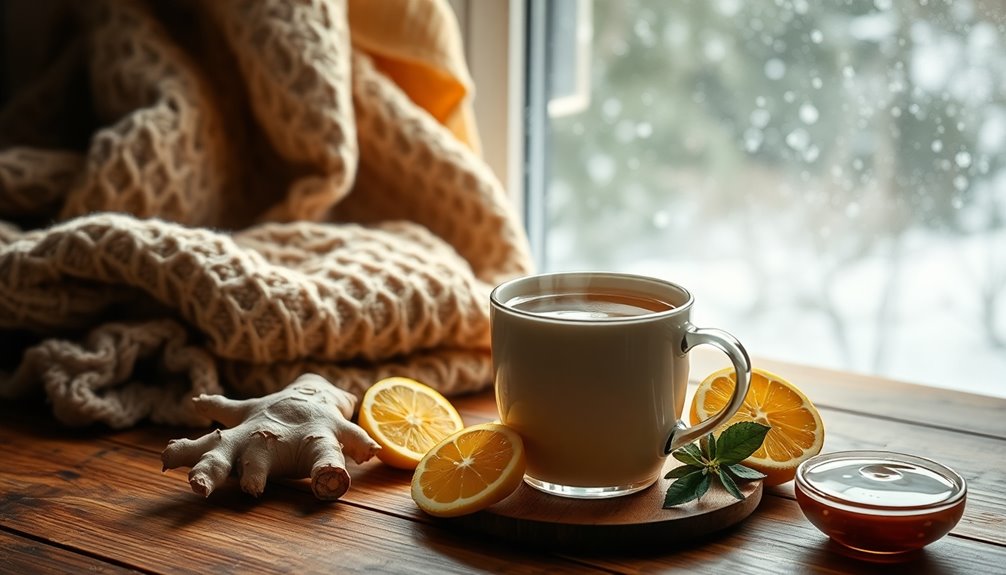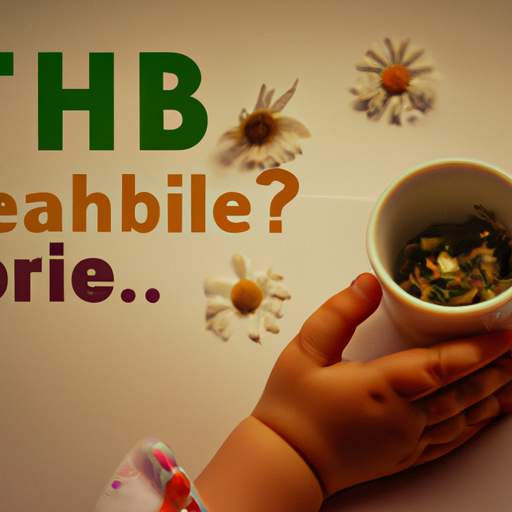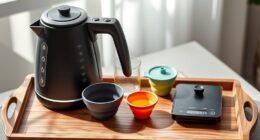Have you ever thought about whether drinking herbal tea can provide relief when you’re feeling unwell? Well, I’m here to confirm that the idea is accurate – herbal tea can truly be a comforting and beneficial drink when you’re sick.
As someone who has experienced the healing power of herbal tea firsthand, I can attest to its effectiveness in alleviating symptoms and providing comfort during illness.
In this article, we will explore the different types of herbal tea that are particularly beneficial for various illnesses, the science-backed benefits of herbal tea when you’re sick, and how to make the perfect cup to maximize its healing properties.
Additionally, we will discuss other natural remedies that can be combined with herbal tea for even greater relief, as well as precautions and possible side effects to be aware of.
So grab your favorite mug, sit back, and let’s dive into the world of herbal tea and its healing potential.
Key Takeaways
- Different types of herbal tea have unique benefits for various illnesses.
- Herbal tea can soothe respiratory symptoms, boost the immune system, and provide hydration.
- Chamomile, peppermint, and ginger tea are popular options for when sick.
- Natural remedies like raw honey, lemon juice, and ginger can be combined with herbal tea for greater health benefits.
Types of Herbal Tea for When You’re Sick
When you’re feeling under the weather, there’s nothing quite as comforting as sipping on a warm cup of herbal tea. Herbal teas come in a variety of different flavors, each offering their own unique benefits for when you’re sick.
Some popular options include chamomile, which is known for its calming properties, and peppermint, which can help soothe a sore throat. Another common choice is ginger tea, which can aid in digestion and settle an upset stomach.
When brewing herbal tea, it’s important to follow the recommended brewing techniques to ensure maximum flavor and benefits. Whether you prefer to steep your tea for a few minutes or let it steep for longer, the choice is yours.
Now, let’s explore the benefits of herbal tea when you’re sick.
Benefits of Herbal Tea When You’re Sick
During illness, indulging in a comforting cup of herbal infusion can provide numerous health advantages. Herbal tea can offer a natural alternative to medication, as it can help alleviate symptoms associated with respiratory illnesses.
Here are three benefits of herbal tea when you’re sick:
-
Soothes respiratory symptoms: Certain herbal teas, like chamomile and peppermint, have anti-inflammatory properties that can help reduce congestion and ease coughing.
-
Boosts immune system: Many herbal teas, such as echinacea and ginger, are known for their immune-boosting properties. They can support your body’s defense mechanisms and help fight off infections.
-
Provides hydration: Staying hydrated is crucial when you’re sick. Herbal tea is a great way to increase your fluid intake while also enjoying the added benefits of the herbs.
Transitioning to the next section about how to make the perfect cup of herbal tea, let me share with you some simple steps to ensure a delightful and healing experience.
How to Make the Perfect Cup of Herbal Tea
Indulge in the art of crafting a sublime cup of herbal infusion that’ll transport your senses to a realm of pure relaxation and rejuvenation. Herbal tea isn’t just a delicious beverage but also a powerful tool for relaxation and stress relief.
The soothing aroma and gentle warmth of herbal tea can calm your mind and body, promoting a sense of tranquility and well-being. To maximize the health benefits of herbal tea, it’s best to drink it in the evening before bed. This allows your body to fully absorb the herbal properties and promotes a restful sleep.
Now that you know how to make the perfect cup of herbal tea for relaxation, let’s explore other natural remedies to combine with herbal tea for even greater health benefits.
Other Natural Remedies to Combine with Herbal Tea
To enhance the health benefits of your evening infusion, consider incorporating additional natural remedies into your herbal tea regimen. Along with herbal tea, there are several other natural remedies and alternative treatments that can help alleviate symptoms and promote healing when you’re feeling sick. These remedies can work in conjunction with your herbal tea to provide a holistic approach to wellness.
One effective combination is to add a spoonful of raw honey and a squeeze of lemon juice to your herbal tea. Raw honey has antibacterial properties and can soothe a sore throat, while lemon juice is rich in vitamin C and can boost your immune system. Another option is to include a few slices of fresh ginger in your tea. Ginger has anti-inflammatory properties and can help with nausea and congestion.
Here is a table summarizing some of the natural remedies that can be combined with herbal tea:
| Natural Remedy | Benefits |
|---|---|
| Raw honey | Antibacterial, soothing for sore throat |
| Lemon juice | High in vitamin C, boosts immune system |
| Fresh ginger | Anti-inflammatory, relieves nausea and congestion |
By incorporating these natural remedies into your herbal tea routine, you can maximize the potential health benefits. However, it’s important to note that precautions and possible side effects should also be considered when using these alternative treatments.
Precautions and Possible Side Effects
Be mindful of possible precautions and side effects that may arise when incorporating these natural remedies into your routine, as they can vary depending on individual circumstances and health conditions. While herbal teas are generally safe, there are a few possible risks to consider.
Some herbs may interact with medications or exacerbate certain medical conditions. It’s important to consult with a healthcare professional before trying any new natural remedies, especially if you have underlying health issues. Additionally, dosage guidelines should be followed to ensure safety and effectiveness. Too much of certain herbs can lead to unwanted side effects. It’s always best to start with a low dose and gradually increase if needed.
With these precautions in mind, let’s move on to the next section about herbal tea recipes for specific symptoms.
Herbal Tea Recipes for Specific Symptoms
When incorporating these natural remedies into your routine, it’s essential to explore various herbal tea recipes tailored to specific symptoms in order to maximize their potential benefits.
Here are four herbal tea blends that can help alleviate common sickness symptoms:
-
Ginger and Lemon Tea: This blend is known for its soothing effect on the throat and its ability to relieve cough and congestion.
-
Peppermint and Eucalyptus Tea: This combination can help clear nasal passages and reduce sinus pressure, providing relief from stuffy nose and headaches.
-
Chamomile and Lavender Tea: These calming herbs promote relaxation and can help with insomnia or restlessness often associated with being sick.
-
Echinacea and Elderberry Tea: This powerful blend boosts the immune system and can shorten the duration of colds and flu.
By incorporating these herbal tea blends into your routine, you can experience the numerous benefits they offer.
Transitioning into the next section, let’s now explore the conclusion and final tips for enjoying herbal tea when sick.
Conclusion and Final Tips for Enjoying Herbal Tea When Sick
In conclusion, embracing the healing power of herbal tea during illness can provide a soothing and natural remedy for common symptoms, ensuring a more comfortable recovery.
Herbal tea is a great alternative to conventional medications and can help alleviate symptoms such as congestion, sore throat, and fatigue. Some herbal tea alternatives that are particularly beneficial for specific symptoms include peppermint tea for digestive issues, chamomile tea for relaxation and sleep, and ginger tea for nausea and inflammation.
It’s important to note that while herbal tea can be a helpful addition to your sick-day routine, it shouldn’t replace medical treatment or advice. Additionally, it’s always a good idea to consult with a healthcare professional before incorporating herbal remedies into your routine, especially if you have any underlying health conditions or are taking medication.
So, go ahead and brew yourself a warm cup of herbal tea, and enjoy the soothing benefits it can provide during your recovery.
Frequently Asked Questions
Can herbal tea cure my illness entirely?
Herbal tea can provide some benefits, but it cannot cure illnesses entirely. While it can help with certain symptoms, it is not a substitute for traditional medicine.
Can I drink herbal tea if I have a chronic medical condition?
Yes, I can drink herbal tea for my chronic medical condition. Drinking herbal tea can provide benefits such as relieving chronic pain and supporting overall wellness. It is a natural and soothing option for managing my condition.
Are there any herbal teas that should be avoided when sick?
Yes, some herbal teas should be avoided when sick. While herbal teas have many benefits for the immune system, certain ones like echinacea or ginseng can be too stimulating and may worsen symptoms.
Can I sweeten herbal tea with honey?
Yes, you can sweeten herbal tea with honey. Honey alternatives include stevia or agave syrup. Herbal tea has numerous health benefits, such as boosting the immune system and aiding digestion.
Is it safe to drink herbal tea when taking medication?
Drinking herbal tea while taking medication can have serious drug interactions. It’s important to consult with a healthcare professional to ensure it’s safe. However, herbal tea can offer various health benefits for overall well-being.
Conclusion
In conclusion, drinking herbal tea when sick can be a beneficial and soothing way to alleviate symptoms and promote healing. While some may argue that herbal tea is just a placebo and lacks scientific evidence, numerous studies have shown the therapeutic properties of certain herbs.
Additionally, combining herbal tea with other natural remedies can further enhance its effectiveness. However, it’s important to remember that herbal tea may not be suitable for everyone and some precautions should be taken.
Overall, incorporating herbal tea into your sick day routine can be a comforting and effective way to support your body’s recovery.










